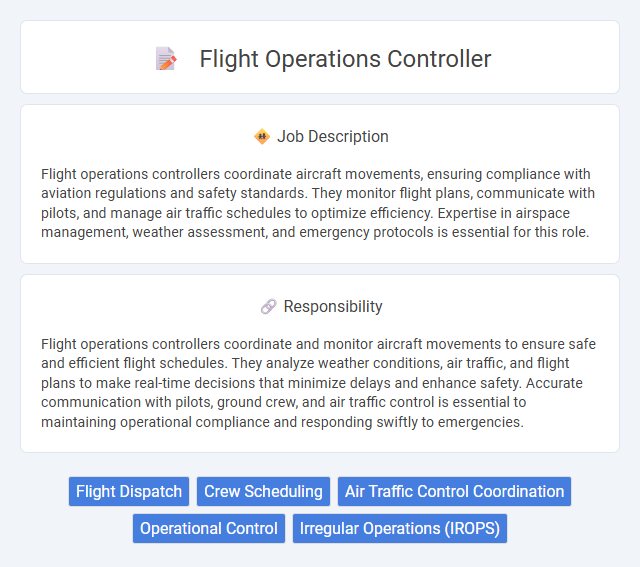
Flight operations controllers coordinate aircraft movements, ensuring compliance with aviation regulations and safety standards. They monitor flight plans, communicate with pilots, and manage air traffic schedules to optimize efficiency. Expertise in airspace management, weather assessment, and emergency protocols is essential for this role.
Individuals with strong multitasking abilities and excellent communication skills will likely thrive as flight operations controllers. Those who can remain calm under pressure and make quick, accurate decisions may find this role well-suited to their temperament. Candidates prone to stress in high-stakes environments might face challenges adapting to the demands of this position.
Qualification
Flight operations controllers must possess a deep understanding of aviation protocols, air traffic control systems, and emergency response procedures. A bachelor's degree in aviation management, aerospace engineering, or a related field is often required, complemented by certifications such as FAA Air Traffic Control Specialist certification or equivalent. Strong analytical skills, attention to detail, and proficiency in flight planning software are essential to ensure safe and efficient flight operations.
Responsibility
Flight operations controllers coordinate and monitor aircraft movements to ensure safe and efficient flight schedules. They analyze weather conditions, air traffic, and flight plans to make real-time decisions that minimize delays and enhance safety. Accurate communication with pilots, ground crew, and air traffic control is essential to maintaining operational compliance and responding swiftly to emergencies.
Benefit
Flight operations controllers likely experience benefits such as competitive salaries and comprehensive health insurance packages, which can contribute to financial stability and well-being. The role may offer opportunities for career advancement within the aviation industry, potentially leading to higher responsibilities and increased earnings. Job security might be strong due to the essential nature of ensuring safe and efficient flight operations.
Challenge
Flight operations controllers likely face complex challenges managing real-time coordination of aircraft movements, requiring quick decision-making under pressure. The role probably involves continuous problem-solving with unexpected changes such as weather disruptions or technical issues. High responsibility and the need for precise communication may intensify the demands of the position.
Career Advancement
Flight operations controllers oversee the coordination and management of airline flight schedules, ensuring safety and efficiency in all operations. Career advancement opportunities often include progressing to senior operations manager roles or specializing in areas such as air traffic control coordination or airline logistics management. Gaining certifications in aviation safety and operations technology enhances prospects for leadership positions within major airlines or aviation authorities.
Key Terms
Flight Dispatch
Flight operations controllers specializing in flight dispatch coordinate pre-flight planning, monitor in-flight progress, and ensure compliance with aviation regulations to guarantee safe and efficient air travel. They analyze weather conditions, aircraft performance, and route optimization while communicating critical information to pilots and ground crews. Expertise in real-time problem solving and aviation software systems is essential for managing flight schedules and responding to emergencies swiftly.
Crew Scheduling
Flight operations controllers specializing in crew scheduling manage pilot and flight attendant rosters to ensure compliance with aviation regulations and optimize workforce efficiency. They analyze flight schedules, crew availability, and legal rest requirements to prevent delays and maintain safety standards. Effective coordination in crew scheduling directly impacts operational reliability and cost management within commercial airlines.
Air Traffic Control Coordination
Flight operations controllers specialize in air traffic control coordination to ensure safe and efficient aircraft movements within controlled airspace. They monitor flight paths, communicate with pilots and air traffic control towers, and manage real-time adjustments to avoid collisions and optimize traffic flow. Expertise in radar systems, aviation regulations, and emergency response protocols is essential for effective coordination in complex airspace environments.
Operational Control
Flight operations controllers ensure safe and efficient airline operations by monitoring real-time flight activities and coordinating responses to delays, weather disruptions, and mechanical issues. They utilize advanced radar systems, flight management software, and communication tools to optimize flight paths, maintain regulatory compliance, and minimize operational costs. Their expertise in operational control contributes to increased punctuality, enhanced passenger safety, and streamlined resource allocation within airline networks.
Irregular Operations (IROPS)
Flight operations controllers specializing in Irregular Operations (IROPS) manage disruptions caused by weather, technical issues, or air traffic control delays to ensure minimal impact on flight schedules. They coordinate real-time communication between pilots, ground staff, and airline control centers, rapidly adjusting flight plans and resource allocation to maintain safety and efficiency. Expertise in advanced flight tracking systems and contingency protocols is essential for optimizing passenger re-accommodation and minimizing operational costs during irregular situations.
 kuljobs.com
kuljobs.com